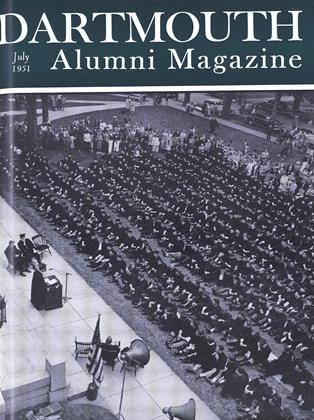by Frederick Dyer '48.published by Exposition Press, New York;1951; 107 pp; $2-50-
Frederick Dyer, who served as a Naval officer in the Pacific during the last war, and who later got his degree at Tuck School, has written a book of poetry, The Black Lily, which shows considerable skill and talent.
It is apparent that he has been influenced by the German Romantics particularly, and some of his poems are curiously reminiscent of Heine's "Youthful Sorrows."
Mr. Dyer's poems are generally short. He avoids difficult verse forms, possibly because he has not mastered them, and probably because what he has to say is best expressed in his own way. His feeling is sincere, and at times he writes good verse.
Those who may be troubled with the obscurity of certain modern verse will find in Mr. Dyer's poems something that they have missed; they are easy to read.
Some o£ the poems deal with the Dartmouth scene, namely "A Winter Walk," and "The Whole World Be Thy Grave."
Mr. Dyer is a Roman Catholic and in some of his poems he reflects Catholic thought and sentiment. There are excellent notes, as well as a short essay expounding his theory of poetry.
 View Full Issue
View Full Issue
More From This Issue
-
 Class Notes
Class Notes1921 Has A Lively 30th
July 1951 By REGINALD B. MINER '21 -
 Article
ArticleThe 1951 Commencement
July 1951 By C.E.W -
 Class Notes
Class Notes1911 Has a Memorable 40th
July 1951 By NATHANIEL G. BURLEIGH '11 -
 Article
ArticleBaccalaureate Address
July 1951 By DR. REINHOLD NIEBUHR -
 Class Notes
Class Notes1926 Holds "Terrific 25th"
July 1951 By PAUL VENNEMAN '26 -
 Class Notes
Class Notes1941 Weathers Its Big 10th
July 1951 By FRANK M. HALL '41
Herbert F. West '22
-
 Article
ArticleHanover Browsing
May 1939 By HERBERT F. WEST '22 -
 Article
ArticleHanover Browsing
February 1940 By HERBERT F. WEST '22 -
 Books
BooksBOLIVAR
November 1941 By Herbert F. West '22 -
 Books
BooksTHE WINOOSKI,
June 1949 By Herbert F. West '22 -
 Article
ArticleHanover Browsing
February 1951 By HERBERT F. WEST '22 -
 Article
ArticleHanover Browsing
June 1956 By HERBERT F. WEST '22
Books
-
 Books
BooksFACULTY PUBLICATIONS
February, 1924 -
 Books
BooksAlumni Articles
FEBRUARY 1967 -
 Books
BooksA HISTORY OP AMERICAN GOVERNMENT AND CULTURE
June 1931 By H. B. P. -
 Books
BooksAMERICAN LITERATURE FOR COLLEGES.
May 1954 By HERBERT F. WEST '22 -
 Books
BooksALUMNI PUBLICATIONS
April, 1922 By J.H.G. -
 Books
BooksEXETER IN 1830. By William Gilman Perry 1842 M.D. EXETER IN 1776.
FEBRUARY 1973 By JOHN H URD '21

